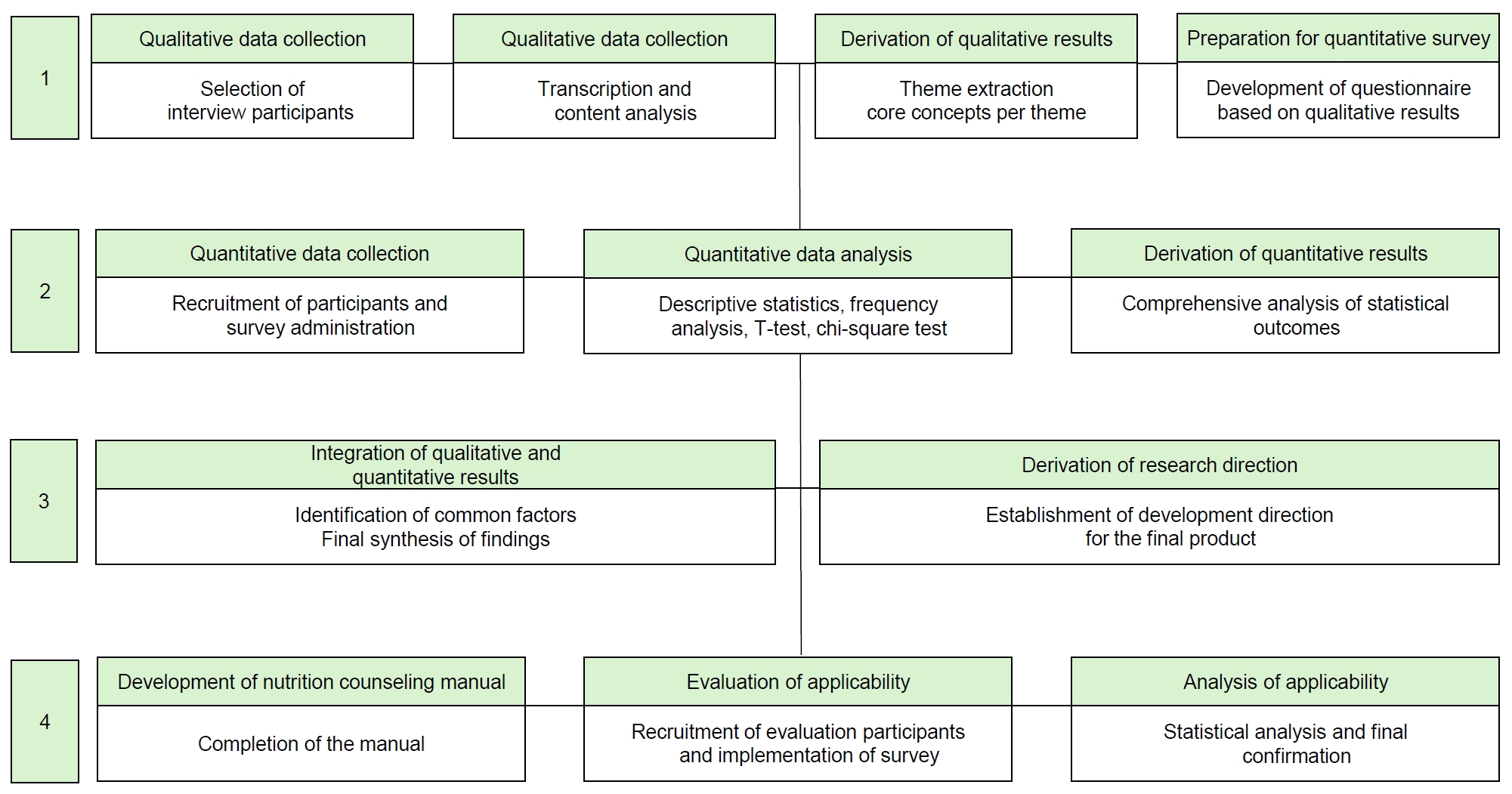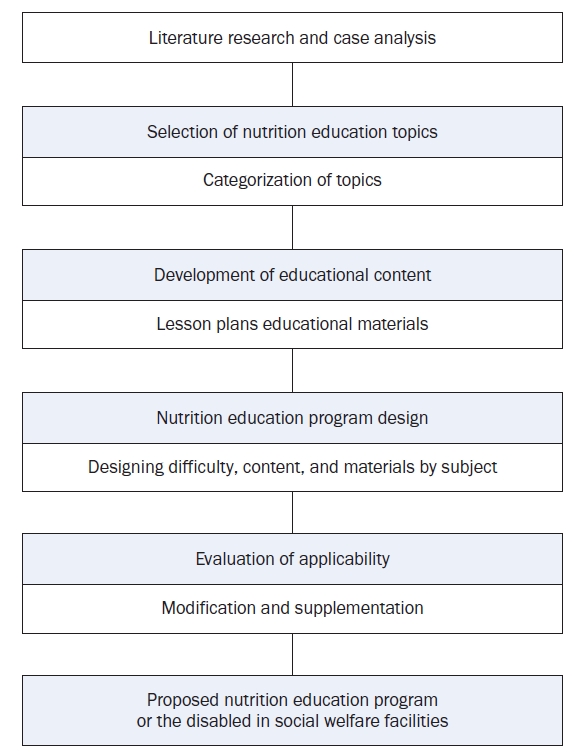- [Korean]
-
A study on the development of nutrition counseling manual and curriculum for the disabled in Korea: a mixed-methods study
-
Kyoung-Min Lee, Woo-jeong Kim, So-young Kim, Young-mi Park, Hwa-young Yoon, Min-Sun Jeon
-
Korean J Community Nutr 2025;30(5):376-388. Published online October 31, 2025
-
DOI: https://doi.org/10.5720/kjcn.2025.00192
-
-
 Abstract Abstract
 PDF PDF
- Objectives
Individuals with disabilities require targeted interventions to ameliorate disability-related conditions and improve overall health status. Nutritional challenges and counseling needs vary according to the type of disability, necessitating comprehensive assessments of dietary habits, physical activity, and food intake. Compared to traditional education, nutrition counseling offers a more sustainable and environmentally adaptable approach that effectively addresses individualized nutritional issues. Therefore, this study aimed to develop and evaluate a practical nutrition counseling manual and meal guidelines for people with disabilities in Korea, addressing their diverse dietary needs and improving nutritional care in social welfare facilities.
Methods
A four-stage integrated research design was employed. Stage 1 involved qualitative research through in-depth interviews with 11 facility staff. In Stage 2, a nationwide survey (n = 249) was conducted based on the results of the interviews. Stage 3 integrated both qualitative and quantitative findings. Stage 4 focused on developing and evaluating a nutrition counseling manual and five types of meal guidelines through feedback from 26 nutritionists at 24 Korean Centers for Social Welfare Foodservice Management.
Results
Six major nutrition counseling topics were identified: healthy eating, managing salt and sugar intake, dysphagia diet, appropriate intake, and hygiene. The manual and guidelines demonstrated high field usability, with average satisfaction scores of 3.98 and 3.99, respectively.
Conclusion
The integrated study resulted in the development of a specialized nutrition counseling manual and handbook for individuals with disabilities in Korean social welfare facilities. The materials were revised and improved based on practical evaluations by dietitians, enhancing their field applicability. These tools are expected to contribute to better dietary management and health promotion among facility residents. The developed materials reflect the real-world needs of people with disabilities and offer practical tools for effective nutrition counseling and dietary management in institutional settings.
- [Korean]
-
Development and applicability evaluation of a nutrition education program for residents and users of disability social welfare facilities in Korea: a mixed-methods study
-
Jin-kyung Kim, Kyoung-min Lee, Min-sun Jeon
-
Korean J Community Nutr 2025;30(1):64-74. Published online February 28, 2025
-
DOI: https://doi.org/10.5720/kjcn.2025.00017
-
-
 Abstract Abstract
 PDF PDF
- Objectives
This study aimed to develop a nutrition education program based on social cognitive theory to promote the health of individuals using facilities for people with disabilities. It also sought to evaluate the applicability of the educational materials through assessments by counselors at the Social Welfare Food Service Management Support Center.
Methods
A group of six experts developed the program based on a needs assessment of nutrition education in facilities for individuals with disabilities. Applicability was evaluated through an online survey of 26 counselors from Social Welfare Food Service Management Support Centers nationwide in July 2023, and the results were analyzed.
Results
The nutrition education program includes a basic course on personal hygiene, dining etiquette, picky eating prevention, and obesity management. The advanced course covers dietary management for chronic diseases, such as meal planning for hypertension, diabetes management, and dietary principles for dysphagia. Additionally, lecture PPTs, individual activity sheets, and experiential teaching aids were developed. Applicability evaluations showed high scores, with the teaching-learning plan and PPT averaging 4.15 and the experiential teaching aids scoring 4.17, all above 4.0.
Conclusion
This study developed a nutrition education program for individuals with disabilities and assessed its applicability and usability. Implementing this program in disability welfare institutions could enhance health promotion and improve the quality of life for individuals with disabilities.
-
Citations
Citations to this article as recorded by  - Development of a standard nutrition management model algorithm for personalized care in social welfare facilities for the disabled
Su-Jin Lee, Ji-Won Kang, Sil Ah Kim, Kirang Kim, Sohyun Park, Jieun Oh, Hyunjoo Ryou, Ji-Yun Hwang
Journal of Nutrition and Health.2025; 58(5): 498. CrossRef
-
2,305
View
-
74
Download
-
1
Crossref
- [English]
-
Nutrition education programs necessary for social welfare facilities for persons with disabilities: a cross-sectional study
-
Jinkyung Kim, Min-Sun Jeon
-
Korean J Community Nutr 2024;29(1):1-15. Published online February 29, 2024
-
DOI: https://doi.org/10.5720/kjcn.2024.29.1.1
-
-
 Abstract Abstract
 PDF PDF
- Objectives
This study investigated the need for nutrition education aimed at improving the health of residents and users of social welfare facilities for persons with disability and aimed to provide basic information for developing a nutrition education program that meets the needs of the field.
Methods
Altogether, 249 employees working in social welfare facilities for people with disabilities were included in the study. Data on the health status of residents/users, meal management, nutritional education, nutritional education needs, and awareness of nutritional education were obtained through online surveys. A descriptive analysis was conducted to analyze the demographic characteristics, needs, and perceptions of the respondents, and independent t-tests and χ2 tests were performed to analyze and compare the differences between residential and daycare facilities.
Results
The majority of residents/users of social welfare facilities for persons with disabilities have developmental disabilities. When educating residents with residents/users of social welfare facilities, ‘personal hygiene’ was the most necessary topic, followed by ‘obesity management’ education. Regarding the methods of providing education, face-to-face lectures demonstrated a high demand. They responded that when nutrition education experts provide nutrition education to people with disabilities, they must understand ‘the physical characteristics of persons with disabilities’ and have the ability to determine appropriate nutrition for such people. The most appropriate nutrition program training would be twice a year, lasting 30 min to 1 h per training session.
Conclusions
It will present a direction for operating a nutrition education program for persons with disabilities that meets their needs of social welfare facilities and ultimately contribute to the establishment and activation of nutrition education tailored to welfare facilities for such individuals in Korea.
-
Citations
Citations to this article as recorded by  - Development and applicability evaluation of a nutrition education program for residents and users of disability social welfare facilities in Korea: a mixed-methods study
Jin-kyung Kim, Kyoung-min Lee, Min-sun Jeon
Korean Journal of Community Nutrition.2025; 30(1): 64. CrossRef
-
1,891
View
-
40
Download
-
1
Crossref
- [Korean]
-
Toward the development of a digital self-nutrition management education program for elderly: findings from focus groups study
-
Hae-song Yoo, Jin-myong Lee, Min-sun Jeon
-
Received September 10, 2025 Accepted November 11, 2025 Published online November 25, 2025
-
DOI: https://doi.org/10.5720/kjcn.2025.00234
-
-
 Abstract Abstract
- Objectives
The aim of this qualitative study was to explore and understand the behaviors and challenges of self-nutrition management from the perspective of elderly.
Methods
In May 2025, ten elderly aged 65–83 years with prior experience using digital devices were recruited through purposeful sampling. Data were collected via focus group interviews using a semi-structured questionnaire until saturation was reached, and all interviews were recorded, transcribed, and analyzed using traditional content analysis methods. The collected interview data were extracted focusing on phrases or sentences relevant to the research purpose, and various concepts derived through memo writing and the constant comparison were categorized based on common meanings. Subsequently, the categorized statements were deeply interpreted and reclassified into subcategories for final analysis.
Results
Under the overarching theme of development directions for a digital self-nutrition management education program for elderly, three main categories and 13 subcategories were derived. The three main categories include: (1) processes of acceptance and utilization of digital technologies; (2) potential for applying digital self-nutrition management; and (3) strategies for implementing digital-based nutrition education.
Conclusion
Our findings indicate that elderly face barriers to utilizing digital tools for self-nutrition management not only due to physical or technical limitations, but also because of the confusion arising from limited nutrition knowledge and information overload. To overcome the barriers that may arise during the digital-based education process for elderly, strategies (educational topics, delivery strategies, and operational strategies) were derived to vitalize a digital self-nutrition management education program. These results highlight the necessity of developing tailored digital nutrition education programs that reflect the characteristics of elderly, which may enhance their practical applicability and provide foundational evidence for establishing a digital–nutrition integrated care model within the senior customized care service.
|














